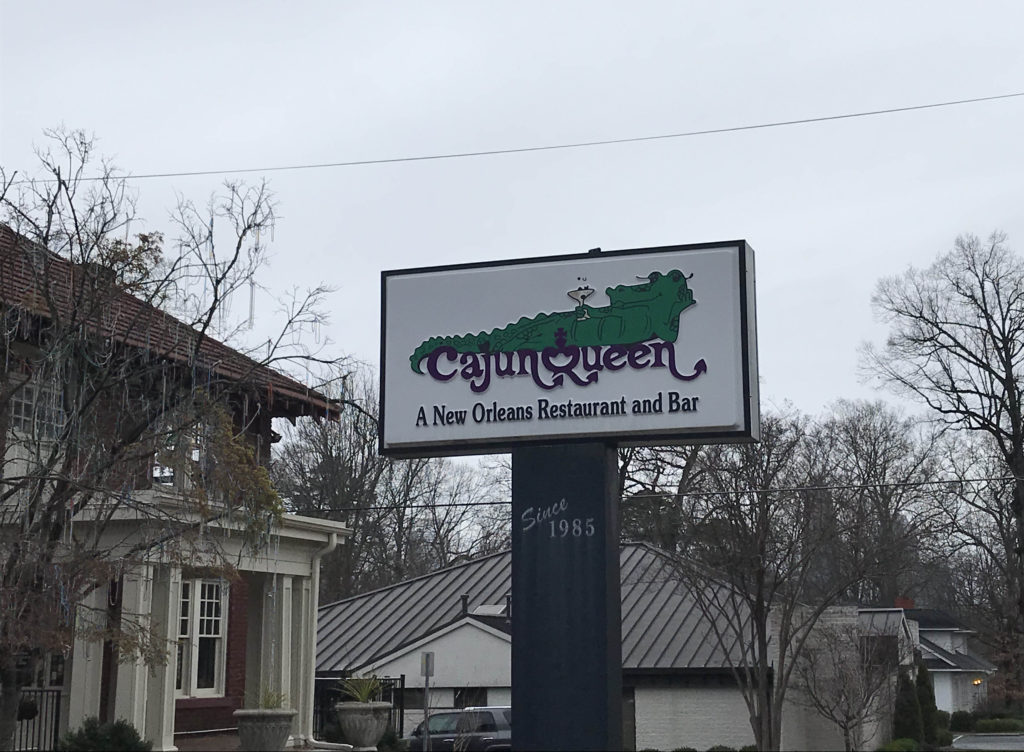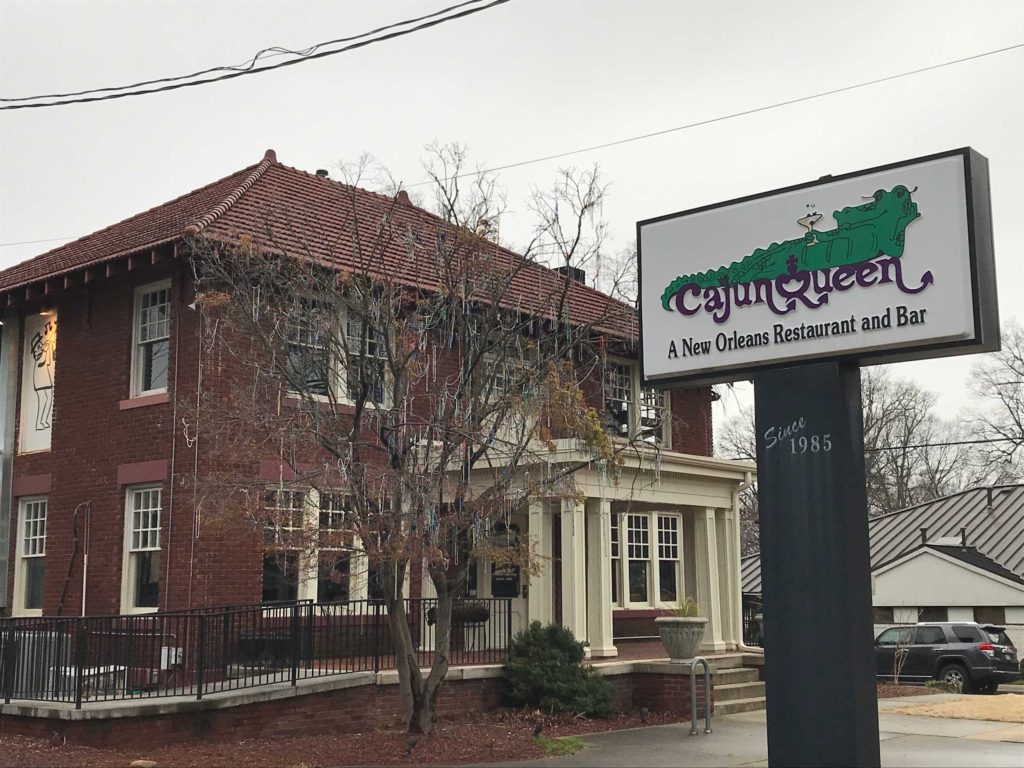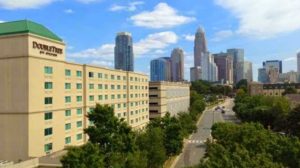Will the RNC Really Make It Rain?

When the Democratic National Convention came to Charlotte in 2012, some businesses made lots of money – like the owner of a limo company.
“We did in about three-and-a-half days what we would normally do in two-and-a-half months in volume and revenues,” said James Weymann, owner of SilverFox Chauffered Transportation in Charlotte. “That’s how good it was.”
But for others, it wasn’t a good week.
“It was probably half of what we’d do on a regular week, let alone staffing up for what we thought would be a tremendous week,” said Tim Freer, a co-owner of Cajun Queen restaurant in Elizabeth.
But to understand the Republican National Convention’s economic impact this year, it’s important to step back and get the big picture of convention spending.
Boosters said the 2012 RNC in Tampa resulted in $214 million in direct spending.
But that same year, Charlotte hosted the DNC, and a study showed that the convention brought in $91 million in spending.
Which is odd considering the events are pretty much the same. And is there any truth in these economic impact studies?
“Just because several thousand, tens of thousands of people show up to participate doesn’t mean there aren’t going to be tens of thousands of people who are chased away,” said Andrew Zimbalist of Smith College, who has studied the economic impact of large events like political conventions.
What’s The Economic Impact Math?
A decade ago, the Charlotte Regional Visitors Authority used to make questionable claims about the economic impact from conventions.
For instance, when Charlotte hosted the National Rifle Association for the second time in 2010, the city initially said it would produce $10 million in direct spending from visitors. But then after the event, they said it produced $70 million in spending. How the city made that enormous jump is unclear.

But the CRVA’s current chief executive, Tom Murray, is more cautious. The questionable economic impact claims were made before he arrived in 2012.
“I always say these big events are always really important to us as a community, particularly in their media value and the way we can reach communities that we normally can’t reach,” Murray said. “But one always has to keep in perspective the hospitality industry is a huge industry in this market — $7.4 billion.”
Murray notes that if a convention brings in $100 million – or even $200 million – then “that’s a small fraction.”
But it’s even more humbling when you look at the size of a political convention in the context of the overall Charlotte metro economy, which is $170 billion. It’s a bit like looking into outer space and realizing how small we are.
So if the RNC brings in $170 million in direct spending – which is a lot more than the DNC generated in 2012 – then that represents a tenth of a percent of the Charlotte area economy.
Murray is also cautious, warning that not every business will do well for the RNC.
“There’ll be a lot of businesses that do really, really well,” he said. “There will be others that didn’t get to participate or didn’t get the kind of customer volume that they had hoped for and may be disappointed.”
Limousine companies, for instance, are expected to do well.
Andy Thompson of Rose Limo said the DNC was the best week of business he’s had in the 35 years he’s been with the company.
“It was big. It was very big,” Thompson said. “It was almost to the point of managed chaos.”
But some restaurants that were outside of uptown did poorly.

Tim Freer is a co-owner of Cajun Queen, a restaurant in Elizabeth that’s near uptown, but wasn’t close enough for convention visitors to reach. For the DNC, they added staff to help with all the extra business they expected.
“We were very, very excited,” he said. “We were hoping it would be one of the busiest weeks of the year. And what we found was it was very disappointing.”
Not only did they not get convention visitors, they were close enough to uptown that locals stayed away.
“We heard all the stories from uptown inside the perimeter, that they couldn’t get any more reservations and that they couldn’t be any busier and we were sitting outside of the perimeter, empty basically,” he said. “And then we found all the people that were living in Charlotte were afraid to even go close to uptown and they wouldn’t come even a mile or two away from uptown to see us, either.”
He added: “So we were just kind of sitting there, twiddling our thumbs, unfortunately.”
Freer said they only got one visit from DNC politicos: Illinois Sen. Dick Durbin.
Carpe Diem, a restaurant nearby, hosted a private event at its restaurant for the DNC and catered another event. This year, co-owner Bonnie Warford is considering a different approach: Either try to do a buyout for the restaurant for the whole week …
“Or if that doesn’t happen, then I would probably just do everything I can to promote that we’re open for normal business and that we’re easy to get to and not part of the convention,” she said.
In 2012, the CRVA’s economic impact analysis for the DNC did take lost business like that into account, somewhat. Its consultant said there was a little more than $7 million in lost business due to the DNC.
But that loss focused on uptown workers staying away, and the impact on retail and restaurants in the center city. It didn’t focus on what happened to businesses in that no-man’s land of Cajun Queen and Carpe Diem.
Who Profits From Hotel Prosperity?
One part of the hospitality industry that does well are hotels. But it’s actually a little complicated in terms of who actually profits.
To understand how the RNC will help the hotel industry, it’s important to understand how the hotel business works in Charlotte.
The convention industry receives a lot of attention, but it’s not a big driver of the Charlotte-area hotel business. The city’s hotel industry thrives because of business travelers, who fill up hotel rooms on Monday, Tuesday and Wednesday nights.
And because business travel is strong, that sometimes makes it hard for the CRVA to attract conventions. The reason? Organizations or groups coming here want to because organizations or groups coming here want cheap hotel rooms. They don’t want to pay $229 a night.
So Charlotte has this situation where the hotel business is pretty good. So good in fact that the Charlotte Regional Visitors Authority struggles to bring business here.

Bill DeLoache is the general manager of the DoubleTree Hotel on Trade Street near Johnson & Wales University.
He explained how the convention business works for hotels, noting that much of Charlotte’s convention business is known as “SMERFS” conventions. That stands for “societal, educational, recreational, fraternal and sports.”
People attending those conventions are generally budget-conscious, and they want cheap hotel rooms.
“So they are typically rate sensitive,” DeLoache said. “So they are going to look for dates where we are willing to dip below our typical rate.”
That was one problem with the CIAA basketball tournament, which is leaving Charlotte for Baltimore after this year. The CIAA and its fans wanted cheaper hotel rooms, but hoteliers didn’t need to slash their rates to fill their hotels.
“Every hotel here, including the Westin, really can survive without a major convention,” DeLoache said. “We’re small enough that we can absorb the corporate business, which is strong.”
But DeLoache says that hotels should sacrifice a little to bring in steady convention business, even if it’s not as profitable.
“Well it’s easy, as you said, to get greedy and restrict convention bookings from your hotel and only take the high-rated corporate,” DeLoache said. “But I think to be a good citizen in the Charlotte hotel industry, we need convention business too. Because when there is a downturn in the economy or when there is a slow period, we need the convention business to be successful.”
He thinks that it’s a smart long-term play to bring conventions here because they can bail hotels out during recessions.
“I’m a believer that, as hotels in the community, we need to support the convention industry,” he said. “But everybody, not every GM, has the same philosophy so to speak.”
The RNC, however, lets hotels charge some of their highest rates.
For the DNC in 2012, hotel revenue in Mecklenburg County increased by 82% when compared to August of the previous year.
In addition to charging high rates, the RNC helps the hotel business because August is a slow month when hotels can’t fill their rooms anyway.
In a usual August, DeLoache said he would encourage people to take time off, or some staff wouldn’t get 40 hours. Now everyone is full time, and some people are getting OT.
But there are some caveats.
DeLoache said the RNC will displace some people who would be staying in hotels anyway. And he said the week before the convention and the week after are both a bust.
“It’s definitely a great event for the city, but when you think about it, your other business doesn’t want to come near us for a week or two before and a week or so after,” he said.
Another issue is that most Charlotte hotels aren’t locally owned. So if a hotel makes an extra $80 a night per room, those profits may leave the city.
The DoubleTree, for instance, is owned by Johnson & Wales.
“Let’s say our net income is around 21, 22%,” DeLoache said. “So that net income does go to the ownership.”
When the CRVA did its economic impact analysis, they accounted for hotel profits leaving the city.
Keeping Profits Local
John Lassiter, the CEO of the local host committee for the RNC, said the committee plans to make sure local businesses benefit from the convention.
“We’re trying to spend local,” he said. “We’re trying to spend with women, minority and veteran-owned businesses and keep that economy moving in our community. And that’s been a high priority with us from the beginning.”
But when asked what that goal was, Lassiter wouldn’t say.
“I’m not going to tell you,” he said.
He said the committee is more like a private business, and that it’s going to be focused on “what’s important.”
The question of how much money stays in the city is difficult to determine.
For instance, Charlotte will receive a $50 million federal security grant for the convention. Much of that money will pay for the overtime for Charlotte police officers, and that money will stay in the area.
But it will also pay the wages of other officers from other departments in other cities.
The CRVA and city officials say that the RNC will provide the city with days of worldwide coverage that can’t be bought.
But what if Charlotte is associated with a divisive speech or comment by the president, such as the “send her back” chant from Greenville last summer.
Murray talked about his confidence in the police and Secret Service’s ability to handle protesters – not a potentially controversial moment from inside the Spectrum Center.
“I think the good news is that these conventions happen every four years and the federal government and the organizing committees are quite skilled at it,” Murray said. “The people that are running these events know what they’re doing.”
But if political conventions are so lucrative, then why aren’t more cities bidding on them?
For the RNC, Charlotte was the only city government to put a bid for the convention. And interest in the DNC appears to be less.
In 2008, there were 11 cities interested in hosting the DNC. This year, Milwaukee is hosting the convention, and news reports show there were only a few other cities interested in the convention: Miami, Houston, Denver, Birmingham, Alabama and Atlanta.
And this may be a case of all the hassle – having your downtown blocked off for a week, and all the preparation – makes the extra money not worth it.
Click here to subscribe to the Inside Politics podcast (and to give the podcast a rating/review in your favorite podcast app).
Want more? You can sign up here for our weekly Inside Politics newsletter, written by Steve Harrison.
Have a question about the 2020 RNC in Charlotte? Ask us below.